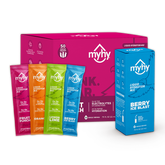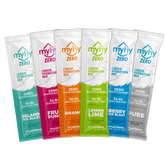First Responder Hydration: Keeping Heroes Well-Hydrated on the Job
When it comes to emergency response and public safety, every second counts. First responders brave perilous situations to protect and serve, often putting their own lives at risk to ensure the safety and well-being of others around them. Their commitment to duty is unwavering, but amidst the chaos and adrenaline of the job, one crucial aspect often gets overlooked: hydration.
Picture this: a firefighter battling a blazing inferno, a paramedic rushing to the scene of a car crash, a police officer chasing down a suspect. These are just a few scenarios where the physical demands on first responders are intense, and the need for proper hydration is crucial.
The Science of Hydration
Our bodies are approximately 60% water, and every cell, tissue and organ relies on proper hydration to function optimally. For first responders, maintaining adequate hydration levels is essential for sustaining physical and cognitive performance, particularly during high-stress situations.
When the body becomes dehydrated, even by just a few percentage points, it can have profound effects on both physical and mental capabilities. Dehydration can lead to decreased coordination, impaired decision-making, fatigue and even heat-related illnesses such as heat exhaustion or heatstroke—all of which can compromise the ability to effectively respond to emergencies.
The Demands of the Job
First responders operate in diverse environments and face a myriad of challenges on a daily basis. From extreme temperatures to strenuous physical exertion, the demands of the job can take a toll on the body's hydration levels.
Firefighters, in particular, often work in sweltering heat while wearing heavy protective gear. The combination of intense heat and physical exertion can rapidly deplete fluids and electrolytes, increasing the risk of dehydration and heat-related injuries.
Paramedics and EMTs are constantly on the move, responding to medical emergencies in all weather conditions. Whether it's treating patients in the scorching heat of summer or braving the bitter cold of winter, staying hydrated is crucial for maintaining focus and delivering quality care.
Police officers face their own set of challenges, from long hours on patrol to high-intensity situations that require split-second decision-making. Hydration plays a vital role in maintaining cognitive function and situational awareness, both of which are essential for effective law enforcement.
The Importance of Electrolytes
While drinking water is essential for hydration, it's not the only factor to consider. Electrolytes—such as sodium, potassium, calcium and magnesium—are also critical for maintaining proper fluid balance and supporting muscle function.
During periods of intense physical activity or prolonged exposure to heat, the body loses electrolytes through sweat. Replenishing these electrolytes is essential for preventing dehydration.
That's where MyHy solutions come into play. By providing a balance of fluids and electrolytes, MyHy helps first responders stay hydrated and energized, enabling them to perform at their best when it matters most.
Tips for Staying Hydrated on the Job
So, how can first responders ensure they stay well-hydrated during demanding shifts? Here are a few simple tips to keep in mind:
-
Drink Early, Drink Often: Start hydrating before the shift begins, and continue to drink water or MyHy regularly throughout the day.
-
Know the Signs of Dehydration: Familiarize yourself with the symptoms of dehydration, such as thirst, dry mouth, fatigue, dizziness and dark urine. If you experience any of these signs, it's essential to rehydrate immediately.
-
Stay Ahead of the Curve: Don't wait until you feel thirsty to start drinking. By the time thirst sets in, you may already be mildly dehydrated. Instead, make hydration a proactive habit.
-
Monitor Your Fluid Intake: Keep track of how much fluid you're consuming throughout the day, especially during periods of intense activity or exposure to extreme temperatures.
-
Choose the Right Beverages: While water is the best choice for hydration, electrolyte-enhanced beverages can be beneficial during prolonged or strenuous activities, as they help replace lost fluids and electrolytes more effectively.
First responders are the heroes of our communities, but even heroes need to take care of themselves, and proper hydration is the foundation of good health and well-being. So, as you suit up for another day on the front lines, remember to keep MyHy by your side.
Place your order today and don’t forget to connect with us on social media!







